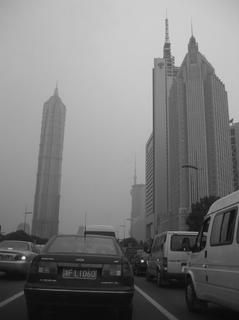The Economic Costs of "Development"
" In the 3 1/2 years since China entered the
World Trade Organization, aggressive industrialization
combined with an outpouring of consumption has
jacked up prices for everything from fertilizer
to transportation, roughly doubling the average
cost of living here.
Those within reach of China's booming coastal cities
have been compensated with new opportunities that have
lifted millions out of poverty, such as factory jobs
making goods for export and cash markets for fruit
and vegetables. But that upside remains beyond this
rural community and thousands of others like it across
this still predominantly peasant country. The costs
of buying food and growing watermelon have climbed
faster than what Wang receives for his crop.
His household income has slipped by 20 percent over
the past five years, to about $300 per year.
"Our lives are more and more difficult,"
Wang said, as his donkey probed the soil near
the family outhouse for stray wheat. "Every year,
it gets harder."
A recent study conducted by the World Bank found
that incomes among rural Chinese -- about three-fourths
of the total population -- have declined slightly
in the years since China entered the WTO, while urban
residents have enjoyed modest gains.
Economists say this trend underscores the downside
of globalization: While free trade has proved highly
efficient in generating wealth, it has failed to share
the spoils, intensifying gaps between rich and poor,
urban and rural. In many instances, new wealth is
coming at the direct expense of the poor as local
governments sell off land for development projects."
Peter S. Goodman "Rural Poor Aren't Sharing In Spoils
of China's Changes: Costs of Goods Rise, Standard of
Living Falls" Washington Post, July 12, 2005

Photo credit: Michel Heurteaux
World Trade Organization, aggressive industrialization
combined with an outpouring of consumption has
jacked up prices for everything from fertilizer
to transportation, roughly doubling the average
cost of living here.
Those within reach of China's booming coastal cities
have been compensated with new opportunities that have
lifted millions out of poverty, such as factory jobs
making goods for export and cash markets for fruit
and vegetables. But that upside remains beyond this
rural community and thousands of others like it across
this still predominantly peasant country. The costs
of buying food and growing watermelon have climbed
faster than what Wang receives for his crop.
His household income has slipped by 20 percent over
the past five years, to about $300 per year.
"Our lives are more and more difficult,"
Wang said, as his donkey probed the soil near
the family outhouse for stray wheat. "Every year,
it gets harder."
A recent study conducted by the World Bank found
that incomes among rural Chinese -- about three-fourths
of the total population -- have declined slightly
in the years since China entered the WTO, while urban
residents have enjoyed modest gains.
Economists say this trend underscores the downside
of globalization: While free trade has proved highly
efficient in generating wealth, it has failed to share
the spoils, intensifying gaps between rich and poor,
urban and rural. In many instances, new wealth is
coming at the direct expense of the poor as local
governments sell off land for development projects."
Peter S. Goodman "Rural Poor Aren't Sharing In Spoils
of China's Changes: Costs of Goods Rise, Standard of
Living Falls" Washington Post, July 12, 2005

Photo credit: Michel Heurteaux


0 Comments:
Post a Comment
<< Home